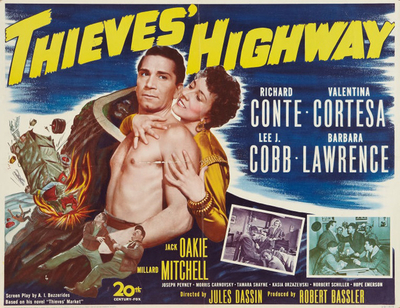It's easy to forget that the years after the end of World War Two in America weren't just a quick change of gears from the arsenal of democracy to the economic boom. This uneasy, decade-long period might have been forgotten if weren't for film noir. Even though it had its genesis in pictures like The Maltese Falcon (1941), Shadow of a Doubt (1943) and Double Indemnity (1944), it was a genre in search of an era, and it found it with the return of the first demobbed G.I.
Former soldiers like Nick Garcos in Thieves' Highway, director Jules Dassin's 1949 story about wildcat truckers hauling produce to markets in big cities like San Francisco. When we first see Richard Conte's Nick, he's getting out of a cab outside of a ramshackle house in a working class suburb carrying a duffle bag and a pile of boxes. He's just returned from sea – a stint working as an engineer on a freighter in the Far East, though we learn later that he served in North Africa and Europe, and that this probably isn't his first homecoming.
These homecomings were a recent memory for millions of Americans, enshrined in Norman Rockwell paintings and analyzed in movies like The Best Years of Our Lives (1946). It's a moment of real joy for Nick and his family, shattered when he gives his father a pair of slippers, only to discover that the old man, an independent trucker, lost his legs in an accident while he was away.
He'd delivered a load of tomatoes to a wholesaler in San Francisco named Mike Figlia and made a tidy sum, and Figlia had taken him out to celebrate. He'd got drunk, and woke up in his truck after a crash with no legs and no money; the old man is sure that Figlia robbed him, but he has no witnesses, no proof and doesn't want to cause any trouble.
On the spot Nick decides to take the money he made on the freighter – money he was saving to get married to his sweetheart Polly – and use it to buy back his dad's truck and gouge the stolen cash from Figlia. It's not the greatest plan, but it lets us know that Nick is a man of action, galvanized by revenge – exactly the sort of heedless protagonist a film noir needs.
To get his not-great plan rolling, Nick has to buy the truck back from Ed (character actor Millard Mitchell, one of those quintessential "hey - it's that guy" actors, because you've seen him in Twelve O'Clock High, Winchester '73, The Day the Earth Stood Still and Singin' In The Rain.) Ed's a tough old character who's been holding the old truck together "with spit" – nearly every reviewer likes to point out that he says this twice – but without paying Nick's dad for it. (Nick's old man is a sweet character, but he's a terrible businessman.)
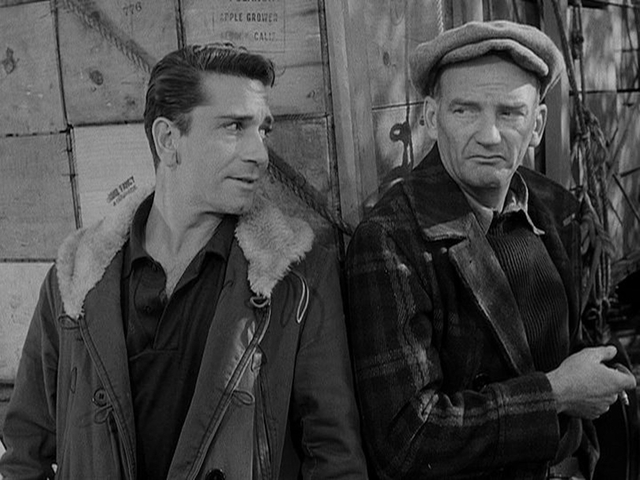
Nick is about to repo it back when Ed comes up with a plan – he has a lead on the season's first crop of Golden Delicious apples, and the two of them can beat everybody else getting them to market if they can come up with $1200 and another truck. The only catch is that Ed had made a handshake deal with two other truckers – Pete (Joseph Pevney, near the end of his brief career as an actor before going on to direct films such as Meet Danny Wilson, Tammy and the Bachelor and The Night of the Grizzly) and Slob (character stalwart Jack Oakie).
Ed has no problem lying to them about being late with their share, or with trying to chisel the immigrant family who own the apple orchard out of $300, and soon enough the two men are on the road, Ed in the busted-down old truck, Nick in a war surplus ten-wheeler with a big US Army white star still painted on the side. We're told that these surplus trucks are filling the roads, the basis of new wildcat fleets.
Dassin does his best to paint a detailed portrait of life on the road for independent truck drivers, portraying challenges like maintaining steady speeds with oversized loads to prevent tire blow-outs, and staying awake on the road for nearly a day. When Nick does blow out a tire, he's nearly crushed and smothered under the truck when his jack fails, and only survives because Ed is following him on the road north to San Francisco. The two men form a bond at this point – companions in the brotherhood of the road – but Ed's truck is still the worst of the two, and he continues taking up the rear at a painfully slow pace, shadowed by Pete and Slob, who taunt him nearly all the way.

Dassin was working with a script by A.I. "Buzz" Bezzerides, based on his own novel Thieves' Market. Trucking was something of an obsession for Bezzerides – eleven years earlier he'd written The Long Haul, another novel about truckers, that was bought by Warner Bros. and made into They Drive by Night, starring Humphrey Bogart and George Raft. This led to a contract writing for Warners, and a career that would produce screenplays for movies like Desert Fury, On Dangerous Ground and his wild adaptation of Mickey Spillane's Kiss Me Deadly.
You can tell a lot about how much people know about Jules Dassin by how they pronounce his name. If they say it with a French accent (Da-SEHN) they probably assume that he was a European expat working in Hollywood before an encounter with the blacklist saw him return home to make films like Rififi, Never on Sunday, Topkapi and Promise at Dawn, many of his films made as vehicles for his second wife, Greek actress Melina Mercouri.
If someone pronounces it DA-ssin, they probably know that the director was born in Connecticut to Jewish immigrants from Odessa, and that he began his career as a teenage actor in the once-thriving Yiddish theatre in New York City. He married his first wife, Beatrice, a Juilliard-schooled concert violinist, and spent three years studying theatre in Europe before returning home to a stage career that stretched from the Yiddish Proletarian Theatre to the post-Orson Welles Mercury Theatre to summer stock in the Catskills borscht belt circuit.
His success as a theatre director led to a contract with RKO, where he worked as an assistant director to Alfred Hitchcock on Mr. and Mrs. Smith but no offers to direct before his contract ended. Dassin didn't lack chutzpah, however, and he made an offer to MGM to direct any picture they gave him for free; instead they paid him to direct a short subject version of Poe's The Tell-Tale Heart, and then a low-budget spy thriller, Nazi Agent, starring Conrad Veidt.
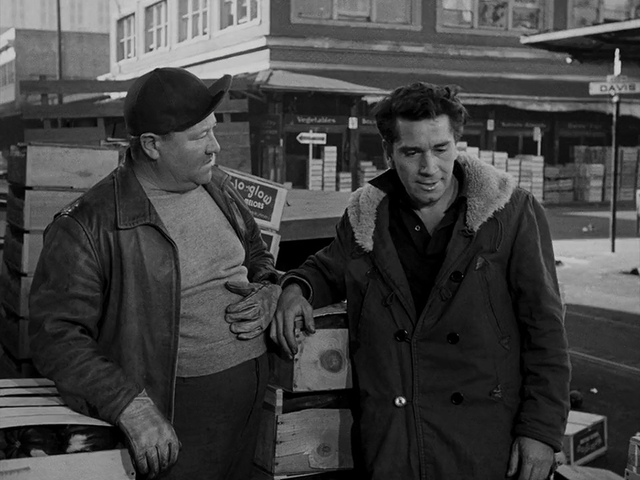
Joan Crawford liked Nazi Agent enough to demand that Dassin direct her next picture, Reunion, with co-star John Wayne. His career as a director of second-string MGM pictures lasted until 1946, after which he signed with producer Mark Hellinger and made his first two really great pictures – Brute Force (1947) starring Burt Lancaster, and the landmark noir film The Naked City (1948). Hellinger's death put his next film in limbo until a deal was made with David O. Selznick's production company for his final picture in the contract – Thieves' Highway.
But while finishing up The Naked City, MGM executive James Kevin McGuinness (no relation) gave testimony to the House Committee on Un-American Activities that linked Dassin to Hollywood communists like Ring Lardner Jr. and Donald Ogden Stewart through a petition they signed to halt production on Tennessee Johnson, a biopic about US president Andrew Johnson. Given his background, it's no surprise that Dassin had links to communist front groups, as a party member, "premature anti-fascist" or fellow traveler, depending on who you believe. His fate in Hollywood was in the balance while he filmed Thieves' Highway.
Bleary-eyed and fatigued, Nick finally makes it to the produce market that was once located on the Embarcadero, just near the tower of the iconic Ferry Building, across the bay from Alcatraz. (As he did with The Naked City, Dassin shot on location as much as possible in San Francisco. The market would be bulldozed in the early '60s for the towers of the Golden Gateway redevelopment) He pulls up his truck by Figlia's sprawling wholesale business and starts looking for the film's antagonist.

Lee J. Cobb plays Figlia as a bully and a cheat, but by no means a stupid man, even though his success is due more to cunning than brains. Cobb was one of the most crucial actors of the postwar American theatre and cinema, and Thieves' Highway was released the same year that the actor starred in Elia Kazan's Broadway production of Arthur Miller's Death of a Salesman. He'd been acting in films since the '30s, but his career would really take off in the '50s, with roles in On the Waterfront, the Man in the Gray Flannel Suit, 12 Angry Men and The Three Faces of Eve.
Cobb's Figlia is the unofficial boss of the market, an object of hate and mistrust who sits spider-like at the centre of its intrigues, and he knows Nick is there before they even meet, improvising a plan to rip him off with ease and some hint of playfulness. He needs to keep Nick marooned long enough to force him to sell his cargo, and he manages it thanks to the combination of a slashed tire and Rica (Valentina Cortese) – a prostitute he hires to offer the exhausted trucker a place to rest in her room while Nick waits for Ed and his half of the load of apples.
Cortese was an Italian actress who had recently arrived in Hollywood after a role in a 1948 version of Les Miserables alongside the young Marcello Mastroianni caught the attention of Darryl F. Zanuck at Fox. She was having an affair with Dassin during the production of Thieves' Highway, and the director is clearly fascinated by the actress and her pivotal role in the drama.
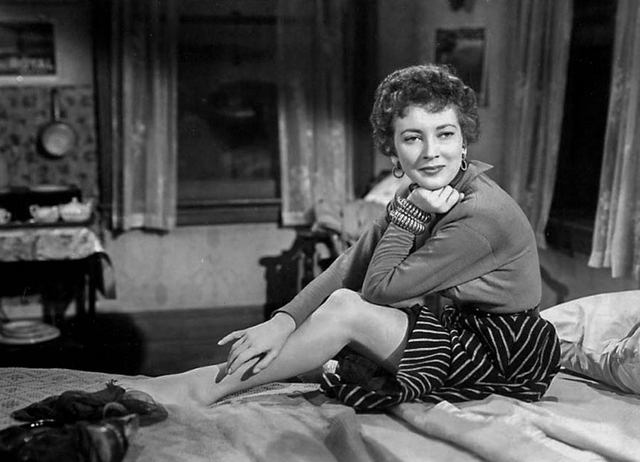
The film does nothing to disguise who Rica is and what she does – a sign that the walls of the production code were already showing cracks. Cortese plays her as earthy and sexy, an Italian immigrant with tight curls, bangles and vividly patterned clothes that telegraph "streetwalker." She's clearly meant to contrast with Barbara Lawrence as Polly, Nick's blonde, American good girl fiancée. Right at the start of the picture we're not allowed to trust Polly, whose reaction to Nick's gift of a Japanese doll is conspicuously muted – until she sees the ring he's hidden on the doll's arm.
"Polly and I have one thing in common," Rica later tells Nick. "She likes money too."
Rica might be a whore, but she's the first person to try to be honest with Nick in the market as Figlia's trap closes in around him. Cortese and Conte have real chemistry, and the script gives them plenty of banter to explore their growing attraction:
"You were somebody's kid sister once."
"And look at me now."
"Soft hands."
"Sharp nails."
Watching old movies often pulls up short on the assumptions of people who imagine more conventional morality governing any film made before, say, Bonnie and Clyde. These people might be taken aback at how naturally Nick, the hero, responds to Rica's flirtation with him, even when (or perhaps because) he knows what she is, and even after he learns that she was on Figlia's payroll. And he has no problem triumphantly calling for Polly to join him in San Francisco after he pressures Figlia to pay him top dollar for his apples – a phone call that Rica overhears with a wry smile.
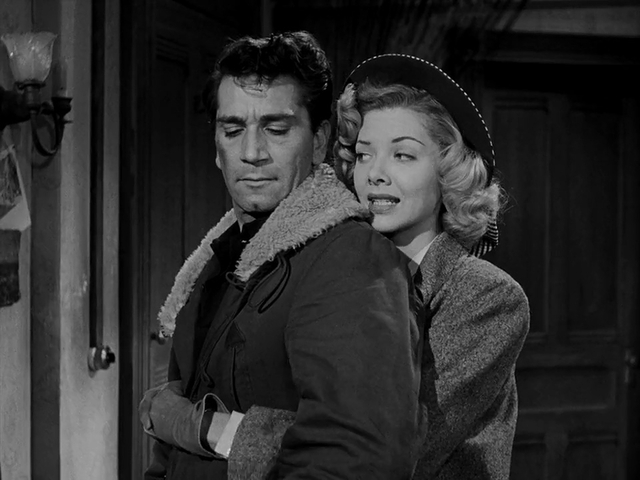
At first it seems like Figlia gives in to Nick's insistence on being paid too easily, until it becomes obvious that he has no intention of letting Nick keep the money, knowing that the son is just as easily taken as his father was. Figlia's muscle ambushes Nick and Rica at night by the cargo railhead by Rica's hotel, beating him up and cornering her in the dark streets – a perfect noir sequence. When Polly arrives at the ferry terminal, Rica takes her back to her hotel room where she learns that Nick has lost all his money to Figlia's henchmen; her voice turns brassy and strident as she points out that he can't even give her the fare to get back home.
"Aren't women wonderful?" Rica asks Nick after Polly leaves.
Nick's negotiations with Figlia happen while Ed is struggling to get his truck to the market. Just outside Altamont the drive shaft breaks at the top of a series of downhill switchbacks; the brakes fail on the way down and Ed and the truck careen off the road and over an embankment, apple crates bursting everywhere, the truck exploding into flames. The first witnesses to Ed's horrible death are Pete and Slob, who make it to San Francisco and tell Figlia; he offers them cash to head back and pick up Ed's apples. Pete agrees, but it's too much for Slob, who stays behind to break the news to Nick.
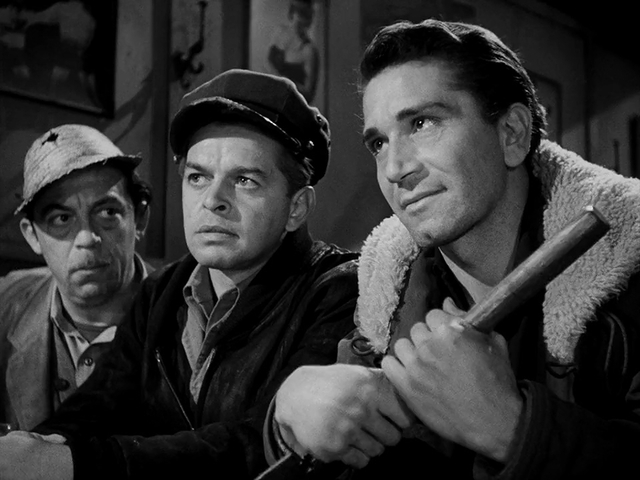
Nick corners Figlia and Pete in a roadside diner; his righteous wrath cows the bully, who loses his allies as Nick throws him over the bar and beats him soundly. It's at this point that the dread hand of Zanuck intervenes in the film. While Dassin was in Britain working on Night and the City, his next film, Zanuck ordered a reshoot with the cops that Rica sends to flush out Figlia's muscle and track him down. They find Figlia unconscious behind the bar, and one of the cops admonishes Nick against vigilante justice.
"Taking care of guys like Figlia is our job."
Their job, as we've seen, didn't involve justice for Nick's dad and his lost legs, or prevent Figlia from running the produce market as his own price fixing and shakedown operation. Indeed, much of film noir is predicated on the cops doing too little and too late, if they're not part of the problem to begin with, but this is nothing like the next change Zanuck made to the story.
Nick arrives back in the city and finds Rica with a bunch of men from the market, reading fortunes and holding court in a dive. He's come back for her, and despite her earlier taunting of him for imagining that he can make a good girl out of her, she's happy to leave behind the bar, the market and her customers when Nick tells her that "I like the way you wear your hair." The film fades out on the two of them in his truck, heading back south to his hometown and a wedding.
Yes, really.
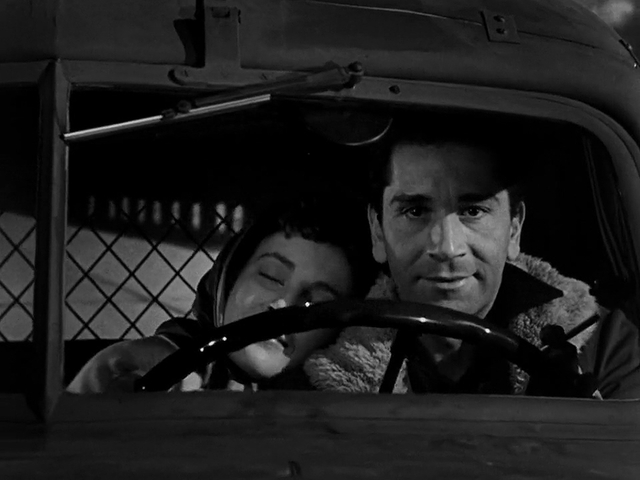
Nobody liked this ending, least of all Dassin, but it's worth imagining the sequel you might make with Zanuck's new ending. Open on the kitchen of Nick's parents' place in Fresno, as Nick bursts through the back door, pulling Rica along by the hand.
Nick: "Ma, Pa – I want to you to meet my new fiancée, Rica. I met her in San Francisco."
(Nick's dad looks up with a jolt of recognition, then lowers his eyes and rolls his wheelchair backwards, edging toward the door to the living room.)
Ma: "But Nicky, what happened to Polly, and who is this girl?"
Nick: "She ran a business in the market! She was the only woman in her profession there!"
Rica: "Oh hey, Mr. Garcos – I didn't think I was going to meet you here!"
Ending aside, Thieves' Highway made $1.5 million for the studio on a tiny budget, and Bosley Crowther of the New York Times wrote that Dassin evoked "the look and 'feel' of people and places in the produce world. You can almost sense the strain of trucking and smell the crated fruit." It often makes lists of best noir pictures and was reissued on DVD by Criterion in 2005.
Conte went on to a long career, among its highlights playing Don Barzini, the Corleones' main antagonist in The Godfather. Valentina Cortese had notable roles in Hollywood films such as The House on Telegraph Hill and The Barefoot Contessa, but would return to Europe and work with directors such as Federico Fellini (Juliet of the Spirits), Franco Zefferelli (Brother Sun, Sister Moon) and Francois Truffaut (Day for Night). One of her last roles was in Terry Gilliam's The Adventures of Baron Munchausen. She died in 2019.
Edward Dmytryk's testimony to HUAC put a halt to Dassin's Hollywood career; he'd join his New York theatre colleague Joseph Losey in exile, and it was a few years before he was able to establish himself in Europe with Rififi. He wouldn't stay out of politics, however, and his opposition with Mercouri to the Colonel's Coup in 1967 forced the couple to leave Greece. His children with his first wife Beatrice all had careers in music; his son Joe Dassin was a popular singer in Europe in the '70s.
Dassin's directing career sputtered in the '70s, and ended on a decidedly low note in 1981 with the critically savaged Circle of Two, a film about an aging painter (Richard Burton) who rediscovers his inspiration when he falls in love with a teenager (Tatum O'Neal). It's hard to decide what's most regrettable about the movie – Burton's typically half-hearted late career performance, the cringey noncery of the plot, O'Neal's topless scene (remembered with dismay by the actress, who was only sixteen at the time), or the fact that it was made in Canada.
Mark Steyn Club members can let Rick know what they think by logging in and sharing in the comments below, as access to the comments section is one of many benefits that comes along with membership in the Mark Steyn Club.


